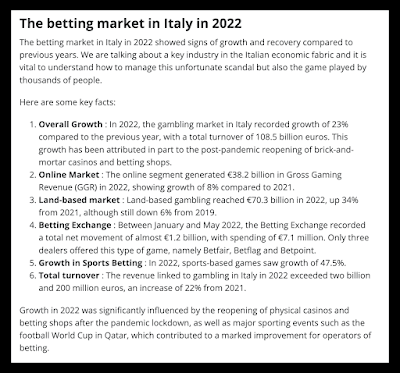Last month, another scandal hit Italian football. Which sadly, is never surprising, and one of the main reasons Serie A continues to struggle as a league. This one, however focuses primarily on a few players. The investigation actually began in late August, apparently, but was blown wide by a man who has served time for extortion. The media claims that the scandal is that these players have been placing illegal bets, with Juventus' Nicolò Fagioli and former Milan favorite Sandro Tonali already receiving bans and treatment for gambling addiction. But the real scandal behind betting in Italy is that only the players are being punished, and that the gambling industry, even the illegal portion, is being protected.
 |
| Is it the grinta? Is that a risk factor in gambling disorder? |
Because of his revelations, both Tonali and Nicolò Zaniolo were escorted from training with Italy at Coverciano last month for questioning, an unnecessary scene, and a huge distraction for the Italian national team at a time when they needed to focus on their Euro 2024 qualification. The prosecutors had not planned to question them yet, nor reveal the scandal to the public, but thanks to low-life Corona and those in the media who paid him for his information, the entire Italy camp was affected by this. And once again, Italian football was in the world spotlight for the all the wrong reasons.
As the accused players have been either exonerated or punished, and loudmouth ex-felons have stopped making a circus of a serious investigation, the interest in this scandal had largely diminished. Until this week, when Milan player Alessandro Florenzi was implicated after messages in the WhatsApp group chat on Fagioli and Tonali's phones were discovered. Florenzi was questioned on Thursday in Turin, and his lawyers have clarified that while he admitted to have used illegal betting sites, he never bet on football, mostly roulette. It is speculated that he will likely only be fined, rather than banned, if his testimony is corroborated.
 |
| Florenzi under investigation, but he may escape a ban. |
Florenzi was allowed to return to training with Milan on Friday. Players face both criminal and sporting sanctions if they have bet on football. Thus far, the FIGC prosecutor's office has yet to open a sporting investigation into his betting issues. The rules on betting for footballers are very explicit, in an effort to keep the game clean from matchfixing. For example, Tonali's ban involved betting on his own teams at both Brescia and Milan, and would have been worse had he bet on his teams to lose, but he reportedly always bet on them to win. Suspicion of matchfixing is typically raised when there is a bet that the team will draw or lose when they are capable of winning. So a ban that could have easily been three years was shortened to 18 months, with eight months of that being probationary, and with requirements for continued treatment for his gambling disorder.
 |
| Tonali is receiving treatment for gambling disorder while he is banned for 10 months instead of 3 years. |
This scandal has brought up conversations around the addictive nature of gambling, for which there is little to no support in place for these players. There is more stigma for gambling disorders than for many other addictions, even though increased research is demonstrating that they are physiologically the same as other addictions, creating the same changes to the brain's reward system and thus becoming more than just a compulsion or even a dependence. One noted distinction is the cognitive distortion related to winning in gambling. But the root causes of gambling disorders come from the same biological, psychological, and social risk factors as other addictions.
To put it simply, addiction is a medical condition, just like other medical conditions, even though there is a lot of stigma around it that people somehow have chosen their circumstances or at least have some type of control over the addiction. They don't. This is a sad societal belief that shames those with these conditions and prevents them from seeking or receiving the help they need. And just because these players are wealthy does not mean they are any less human or susceptible to addiction.
 |
| Fagioli got a shorter ban for cooperating, but has excessive debts from his gambling disorder. |
In fact, the industry they are in actually makes them more susceptible than others, not unlike someone with alcohol use disorder working in a bar, or someone with an eating disorder working in a restaurant. Football is an incredibly high stakes environment built on money. So much money. Football is also immersed in gambling. Sponsored by betting, supported by betting, and with betting being sustained by football.
This hypocrisy, of players being immersed in such an environment, yet being severely restricted as to their ability to participate in betting activities, is absurd. Even more ludicrous is that their jobs are what people are actually betting on, and what the industry is actually profiting from. What makes it near criminal is that no one in the gambling industry, the FIGC, Serie A, or at club level are even acknowledging this problem, let alone addressing it or supporting those with gambling disorders. The players are victims of a corrupt system, and they are paying the price all the way around.
 |
| In England, fans are making efforts to get gambling ads out of football. But Italy wants the revenue. |
This becomes even more evident when you look at the conversations about this scandal and those involved. In an interview with Marcello Presilla, a lawyer and Integrity Manager for Italia Sportradar, whose job is to monitor and protect sporting integrity, he dismisses the plight of the players and insists that "Betting should not be criminalized." While painting athletes as rich and entitled young "kids" with too much time on their hands, rather than human beings with a physiological condition who have been placed in a very difficult circumstance, he insists that he and his company are doing their job to teach these "kids" the rules. But no support system, no treatment centers, no limits on betting advertising in football. It's all up to the "kids." Because they're rich. And they are bored and have free time.
Calcio e Finanza ironically then concludes the article with a report on the financial importance of the betting industry in Italy. "We are talking about a key industry in the Italian economic fabric and it is vital to understand how to manage this unfortunate scandal but also the game played by thousands of people." In other words, taking money from all of the people who suffer from gambling disorders, not just the players, is more important than addressing the problem.
 |
| Sports betting saw 47.5% growth in 2022. 47.5% growth. |
Most importantly, the €2 billion per year betting industry is being protected, while the young footballers are being punished. The monster that saw an overall growth of 22% last year alone and is harming so many people throughout the country, destroying the lives of people who are not wealthy just as much as it is ruining the careers of young footballers, is being protected and supported through this scandal. Even the illegal betting companies are apparently not being charged or prosecuted. But those who used their sites are. This is the real scandal behind betting in Italy.
So to recap, an ex-felon sold information he received from the uncle of an ex-Inter player to break the news of a scandal that harms footballers, their teams, and all of Italian football. Meanwhile, the ginormous €200 billion per year industry that fostered their gambling disorders and the addictions of so many others who are making them rich is being protected. Including the illegal sites for which the players are being criminalized for using. There is no support system for those with gambling disorders, and in fact, the addiction is so stigmatized in Italy, it is seen as some kind of fun pastime instead of something that destroys people's lives. But sure, let's support the criminals and the industry that is profiting on people with mental health and medical issues. That is the real scandal behind betting in Italy.
Elaine has been invited to be a guest on the Keep Going Podcast this Sunday
Talking to Luke, Pat, and Jacqui about ending the stigma surrounding Mental Health
Check out their podcast on Apple, Spotify, and YouTube
and follow them on Instagram and Twitter
For more about mental health, check out my other project, the
Total Football Mentality Podcast on Apple, Spotify, or wherever you get your podcasts
and follow Elaine on Instagram totalfootballmentality and Twitter @TFMentality



